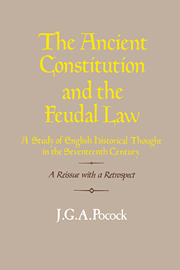 The Ancient Constitution and the Feudal Law
The Ancient Constitution and the Feudal Law Book contents
- Frontmatter
- Contents
- Preface
- Preface to the First Edition
- Part One The Ancient Constitution and the Feudal Law
- I Introductory: the French Prelude to Modern Historiography
- II The Common-law Mind: Custom and the Immemorial
- III The Common-law Mind: the Absence of a Basis of Comparison
- IV The Discovery of Feudalism: French and Scottish Historians
- V The Discovery of Feudalism: Sir Henry Spelman
- VI Interregnum: the Oceana of James Harrington
- VII Interregnum: the First Royalist Reaction and the Response of Sir Matthew Hale
- VIII The Brady Controversy
- IX Conclusion: 1688 in the History of Historiography
- Part Two The Ancient Constitution Revisited: a Retrospect from 1986
- Index
VII - Interregnum: the First Royalist Reaction and the Response of Sir Matthew Hale
Published online by Cambridge University Press: 18 November 2009
- Frontmatter
- Contents
- Preface
- Preface to the First Edition
- Part One The Ancient Constitution and the Feudal Law
- I Introductory: the French Prelude to Modern Historiography
- II The Common-law Mind: Custom and the Immemorial
- III The Common-law Mind: the Absence of a Basis of Comparison
- IV The Discovery of Feudalism: French and Scottish Historians
- V The Discovery of Feudalism: Sir Henry Spelman
- VI Interregnum: the Oceana of James Harrington
- VII Interregnum: the First Royalist Reaction and the Response of Sir Matthew Hale
- VIII The Brady Controversy
- IX Conclusion: 1688 in the History of Historiography
- Part Two The Ancient Constitution Revisited: a Retrospect from 1986
- Index
Summary
DURING the Interregnum there also occurred the first signs of a royalist reaction in the field of historiography; but this reaction, though it produced some new and valuable criticisms of the traditional accounts of constitutional history, did not of itself lead to a radical reassessment of the whole subject. That could come only when feudal institutions were given their proper place in English history, and the royalist writers before and just after 1660 lacked many of Spelman's works and did not fully understand those which they had. They sought merely to provide a history of the constitution which would emphasize the original and essential nature of the king's authority; and while this was not without its value as a means to criticizing the concept of the immemorial, its power to bring about a deeper understanding of history was limited. It is noticeable, too, that the reinterpretation they did provide depended rather on changes taking place in royalist political theory than on developments in the field of scholarship; and this may help to explain the curious fact that a genuine royalist historiography seems to have been delayed until at earliest the years between the first and second civil wars.
- Type
- Chapter
- Information
- The Ancient Constitution and the Feudal LawA Study of English Historical Thought in the Seventeenth Century, pp. 148 - 181Publisher: Cambridge University PressPrint publication year: 1987
